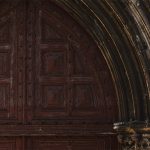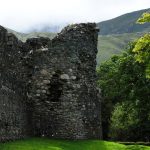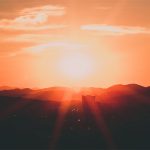A coronavirus Psalm?
Psalm 121
1 I lift up my eyes to the hills—
from
where will my help come?
2 My help comes from the Lord,
who
made heaven and earth.
3 He will not let your foot be moved;
he
who keeps you will not slumber.
4 He who keeps Israel
will
neither slumber nor sleep.
5 The Lord is your keeper;
the Lord is your shade at your
right hand.
6 The sun shall not strike you by day,
nor
the moon by night.7 The Lord will
keep you from all evil;
he
will keep your life.
8 The Lord will keep
your
going out and your coming in
from
this time on and forevermore.
Psalm 121 is one of the songs of ascents. These are a small collection of songs towards the end of the book of Psalms sung by pilgrims on their annual journey to Jerusalem. A song book within a song book. The opening verse is probably among the better known verses of the Old Testament. The older versions expressed it this way:
‘I will lift up mine eyes to the hills from whence cometh my help.’
That’s how I memorised it when I was a child. However the suggestion of that rendering is that our help comes from the hills. And that is exactly the opposite of what the psalmist wanted us to sing and remember. Later versions show that it is not a statement but a question. Here’s why…
When the Israelites settled the land of Canaan, they did not cast out all of the local inhabitants but allowed some to remain along with their Canaanite gods. In Canaanite thinking, the blessings of Baal came from the hills, shaped like a mother’s breast, and flowed down to the valleys; so that’s where their shrines were established. The Canaanites also worshipped the sun and moon.
As the pilgrims journeyed, they walked through long valleys on risky roads with hills on either side. There would be evidence of Canaanite shrines and gods. And the temptation to merge the worship of Yahweh with the worship of those gods was strong. Some already had begun to do this.
What the psalmist was saying that as he lifted up his eyes to the hills he would see what was happening up there. And then he asked himself the question, ‘Where does my help come from?’ His answer is clear, Verse 2: ‘my help comes from Yahweh.’ Not from any other gods or any other shrine. It is Yahweh who will protect and preserve me. The gods of the sun and the moon will not harm me because Yahweh is at my right hand. He will prevent even my foot from slipping.
Verses 7 and 8…
The Lord will keep you from all evil—
he will watch over your life;
the Lord will watch over your coming and going both now and forevermore.
It is here that the older versions of far more helpful than the NIV. The word in italics above is actually the word for wickedness or evil. The NIV translates it as ‘harm’. But it is not every physical injury from which God protects us—we all suffer anything from stubbed toe to a childhood broken limb to a thumb hit with a hammer. And we are all susceptible to everything from a common cold to weakening eyesight. It is part of life in a fallen world.
What Yahweh will protect us from is evil. Even in times of physical injury or illness—whether healed by medicine or miracle, or whether they linger to this day —the promise is that no evil will befall us. God can and will work through all circumstances—even the current virus— for our good and his glory. (Romans 8:28) Even amidst the coronavirus we are in his hands. ‘Yahweh watches over you…’ Verse 5
As we look to the hills what gods present themselves as saviours? Science? Politicians? Stocks of toilet paper and pasta? Could any of these answer the question, ‘Where does my help come from?’ God may use science, the wisdom of politicians and even ensure we are at a supermarket just as the delivery truck arrives. Ultimately it is the hand of Yahweh that is upon us. In this is our confidence. To him we look.
I memorised this Psalm when I was about eight years old. I still remember it word for word. And it still seems to me a deep well of wisdom in which to find confidence in the guiding, protecting hand of Yahweh.
Suggestions:
• A regular reading and even memorising of this wonderful song.
• If you have a memory of this Psalm, or an experience to which this psalm speaks, why not share it with one another?
Peace,
Ray Barnett






